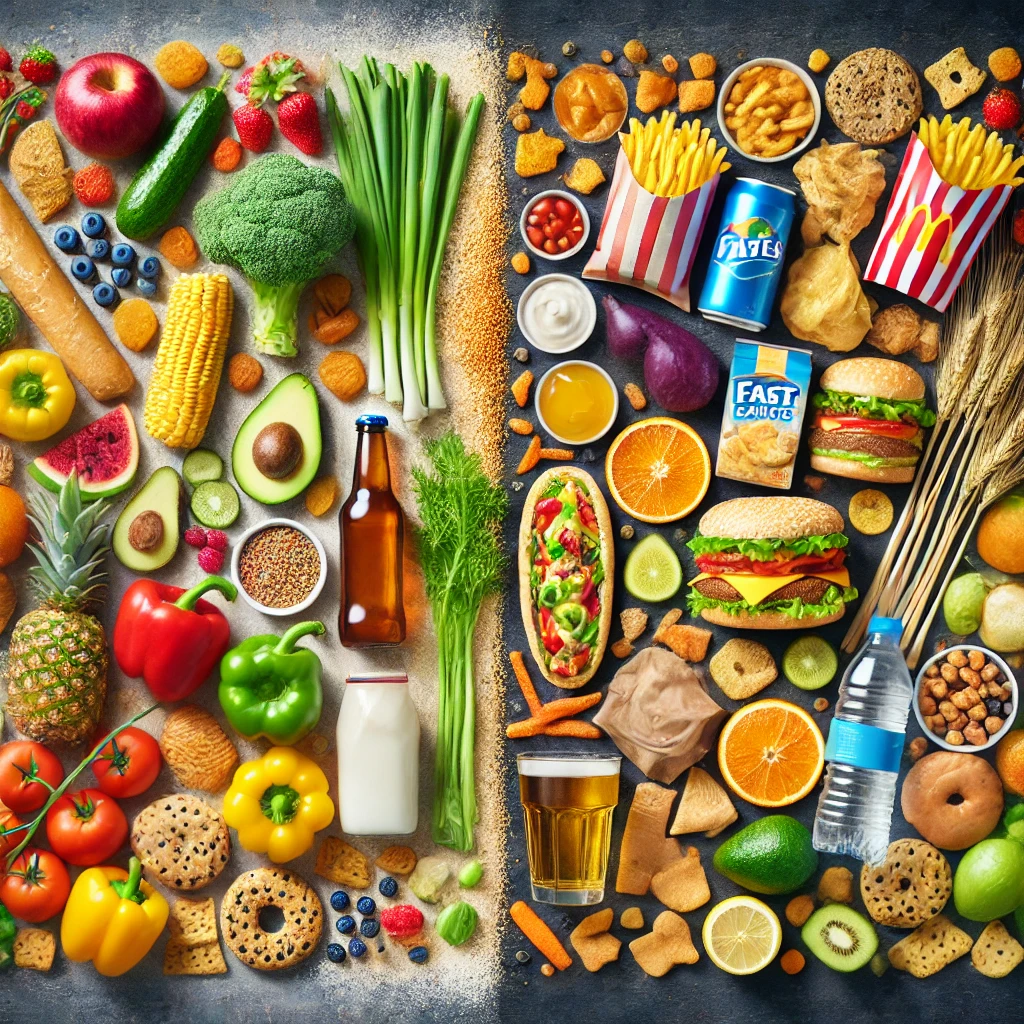Introduction
In today’s fast-paced world, processed foods and ultra-processed foods have become a staple in many diets due to their convenience and extended shelf life. However, growing research highlights the health risks associated with these foods, making it essential to understand their impact and make informed dietary choices.
Understanding Processed Foods
Processed foods and Ultra-Processed foods are industrially manufactured products containing minimal whole foods, often loaded with food additives, artificial flavors, and preservatives.
The NOVA classification system divides foods into four categories:
- Unprocessed or Minimally Processed Foods: Natural foods that have undergone minimal alterations, such as washing or cutting.
- Processed Culinary Ingredients: Extracted substances like oils and sugars used in cooking.
- Processed Foods: Foods modified for durability or taste, including canned vegetables and cheeses.
- Ultra-Processed Foods: Highly industrialized products like sugary cereals, sodas, and packaged snacks that contain food additives and artificial components.
Health Risks Associated with Ultra-Processed Foods
Research consistently links processed foods to significant health risks, including:
- Obesity: These foods are calorie-dense, nutrient-poor, and often lead to overconsumption due to their high levels of refined sugars and unhealthy fats.
- Cancer: Some studies suggest that a diet rich in processed foods may increase the risk of certain cancers, partly due to harmful food additives and preservatives.
- Chronic Diseases: Frequent consumption of these foods has been associated with cardiovascular disease, diabetes, and hypertension.
Role of Food Additives in Processed Foods
Food additives enhance the taste, appearance, and shelf life of processed foods, but some additives pose health risks:
- Artificial Dyes: Some synthetic dyes have been linked to hyperactivity in children and potential carcinogenic effects, leading to regulatory scrutiny.
- Preservatives and Flavor Enhancers: While they prolong freshness, certain preservatives have been associated with metabolic disorders and digestive issues.
Economic Factors and Food Industry Practices
- Affordability: Processed foods are often more affordable than fresh, whole foods, making them an accessible option for lower-income populations.
- Food Industry Practices: Manufacturers prioritize profit, using low-cost ingredients and aggressive marketing tactics to promote processed food consumption.
Public Health Policies and Dietary Guidelines
Governments and organizations are taking action to address health risks associated with processed foods:
- Regulatory Actions: Some states have banned harmful food additives, and policymakers are considering front-of-package warning labels.
- Dietary Guidelines: Public health authorities recommend minimizing consumption of processed foods while promoting whole, nutrient-dense alternatives.
Consumer Awareness and Behavioral Shifts
Increasing consumer awareness is driving a shift toward healthier eating habits:
- Dietary Changes: More individuals are choosing whole foods over ultra-processed foods and ultra-processed foods to enhance nutrient density and overall health.
- Advocacy for Transparency: Growing pressure on the food industry to disclose ingredient lists and reduce harmful food additives.
Environmental and Social Considerations
- Sustainability: The production of ultra-processed foods contributes to environmental degradation, including excessive plastic packaging and resource-intensive manufacturing.
- Cultural Impact: The widespread adoption of ultra-processed foods is influencing traditional diets and food cultures worldwide.
Conclusion
The growing consumption of processed foods presents significant health risks, including obesity, cancer, and chronic illnesses. While these foods are convenient and affordable, their long-term health effects raise serious concerns. By following updated dietary guidelines, supporting public health policies, and promoting consumer awareness, individuals can make healthier food choices. Governments, policymakers, and the food industry must also take responsibility for creating a food environment that prioritizes well-being.
Call to Action: Make informed food choices, advocate for better public health policies, and reduce reliance on processed foods to support long-term health and sustainability.
Read More: The 15 Unhealthiest Junk Foods

